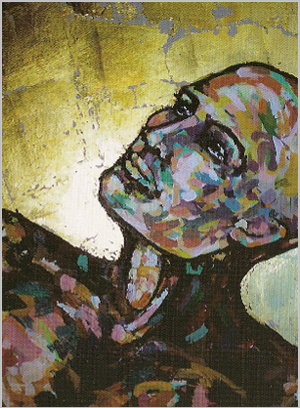Hi Everyone,
A massive thank you to everyone who has commented so positively on this poem, which I wrote recently. Feel free to download it and do what you want with it.
God bless you all - if you want to check out the charity that I lead and what we do, then click
here
-you can make an enquiry about me preaching there to, which many of you have been asking me about by text or email.
God bless you all
Malcolm Duncan
God-Gazer
I want to be a God-gazer,
captured by the brilliance
that springs from the radiance
of You.
I want to be a God-gazer!
Not a cheap food grazer
or an easy option lazer.
I want to be a trail-blazer
for the ordinary, everyday life.
I want to be a God-gazer -
not just copying the halcyon ways
that shimmer brighter in the haze
of by-gone rays and the good old days.
I want to be a God-gazer!
Looking beyond the trappings of success,
cutting through the stucco of respectability
like a laser piercing darkness.
I want to be a God-gazer!
Reaching for the stars and
seeing beauty in the moment by
becoming fluent in the language
of the God Who is here, Who is now.
I want to be a God-gazer
until my imagination is saturated;
until my thirst is sated;
until my passion is stirred;
until my intellect is stretched
as far as it can be;
until my yearning yearns
for others to be free.
I want to be a God-gazer -
not a meetings manager
or a people pleaser
or a 'tea and sympathy' vicar -
not a leadership trainer,
not just a speaker
but a seeker.
I want to be a God-gazer...
and for a moment I want God
to gaze through me.
I want others to see
His eyes
Heart
Mind
and Love
above everything else in me.
I want to be a God-gazer
captured by the brilliance
that springs from the radiance
of You.
Life-giver!
I want to be a Life-giver
not a life-sucker.
I want my life to be releasing
not appeasing or placating.
I want to be a Life-giver,
A drainpipe without blockages,
A circuit without stoppages,
A connector without breakages.
I want to be a Life-giver!
A 'you can do it' releaser,
A 'have a go' preacher,
A 'you were born to do this' pastor.
I want to be a Life-giver -
Seeing rivers flow, not die,
Seeing others rise and fly,
Helping friends reach for the stars
even if they sometimes miss.
At least they can say they tried.
I want to be a Life-giver,
Generous in spirit and in heart,
Letting the forgotten make a start
at being Life-givers, too.
I want to be a Life-giver
because I am a God-gazer
not because it's about me
but because it's about Him
because life can't spring
from any other 'thing'.
I want to be a Life-giver
connected to the Source
and pointing to the Son -
standing in the shadow of the Light
celebrating Him.
World-changer.
I want to be a World-changer
not just a furniture re-arranger
or an 'it could be better' winger
or a 'have the left overs' stinger.
I want to be a World-changer!
A doer, not just a talker.
I want to spread the clothes of heaven,
No more or less than a poor man's dreams,
beneath the feet of Jesus.
I want to be a World-changer -
'Cos on a morning many winters ago
the tomb was open
and the curse was broken.
Death had to let go
and re-creation burst out
of an old wineskin
like water from a geyser,
Like the cry of a child
pushed into the world
and nothing
would shut Him up.
I want to be a World-changer
because it's started...
because the vanguards on the move...
and love is pushing out hate
and light is shining out
and darkness can't understand it
beat it
change it
hide it
kill it
stop it
win.
I want to be a World-changer
because there's safety in this danger.
There's meaning in this purpose.
There's joy in this mission
and too many others are missing
the power of life in all its fullness.
World-changer? Life-giver? God-gazer.
God, break in - then break out
Fill - then make me leak.
Plug me in and push me out.
In me, through me, around me.
Make me a Patrick.
Make me a Brendan.
God-gazing, life-giving, world-changing.
Captured by the brilliance
that springs from the radiance
of You.
Malcolm Duncan
January 2010
(c) Malcolm Duncan
For more info, please contact malcolm@churchandcommunity.org







